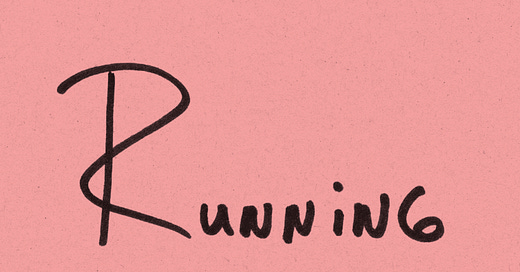Writing, Running, and Living with Lindsey A. Freeman
This is what I want to read about when I read about running. It’s my favorite book about running... maybe ever. I speak to the author, Lindsey A. Freeman, about life as a runner and as a queer woman.
There’s an ever-expanding amount of running literature available to us. Indeed, with this newsletter, I’m adding to it - hopefully in a positive manner.
The vast majority of specialist books are written by leaders of that industry. For us, that’s elite runners, famed coaches, people whose stories have resonated on social media to the extent that a book deal comes their way.
Running, by Lindsey A. Freeman is different. She simply wrote a book about her life in running, and it’s magnificent.
I first saw the distinctive pink cover on someone’s Instagram story but didn’t really take notice. Then former interview subject Nick Thompson mentioned it in his newsletter, sparking familiarity, so I ordered it from Duke Press. Then I saw the L.A. run club Capri Collective celebrating the smaller-than-normal, A7-sized book with a special t-shirt.
The book was being noticed despite Lindsey’s lack of conventional status. A lifelong runner, including achieving some serious accolades at college D1 level, this book transcends notoriety.
There are 133 pages made up of 22 chapters (some barely a page) of gentle thoughts and prolonged musings built up over a lifetime of running. Written from a queer perspective through a academia-friendly lens, texts are cited with subjects ranging from French philosophy to queer and feminist theory to sports trivia and anthropology. As I mentioned, it’s a book about her life as a runner.
Part of a diverse series of handbooks called Practices by Margret Grebowicz (they met in the Chernobyl exclusion zone), Running is a thoroughly unique and powerfully human work.
It’s a book that talks about being a woman - mostly pertaining to running but sometimes not. It talks about being a queer woman - mostly pertaining to running but sometimes not. It’s both self-aware and fully, actively conscious of everything and everyone around it, maybe especially of those in the marginal spaces. It talks about success as much as it does about disappointment, from both a personal point of view and from society’s.
Running is Lindsey’s third book. Knowing that her first two books are similar collections of essays about atomic culture based on the nuclear test zone she grew up in might help explain the Ukrainian meeting point with her editor. She tells me how this book was a somewhat nerve-wracking departure in subject, but maybe not in style.
For me? It’s a perfect book. The bitesized chapters have allowed me to absorb the words gradually and comfortably during my somewhat chaotic life. The running insights dotted throughout the book are interesting, personable and nicely digestible. The neuroses she describes kept on bringing wry chuckles to my craw.
And even though I can never 100% understand her personal experiences as a woman and as a queer person, my learnings as a brown male growing up in English society mean many of the topics, moments, and feelings Lindsey writes of are eminently relatable in a way that I’ve not really seen channeled through a running text before.
Why do you think Running has resonated with so many people?
“I think it is because of coming from that marginalized position of not seeing myself in other running books, for example, or in the mainstream advertising of our sport.”
“What I've talked about with folks from other marginalized communities is that running is a very vulnerable sport, because there's not a lot of other things there. It's just you and your body, and your little shorts.”
Tell me about the emergence of queer running spaces
“There was an explosion of running clubs [in the pandemic] and I think that queer running clubs were part of that, but I find in most places [running groups are led by] white cis men. I've run a few times with groups here and they're really lovely, but it's not really who I hang out with, so my friends and I have our own running group. We didn’t intentionally make a queer running group, but it is a queer running group. I think it is important because it’s social.”
“It’s nice to do a thing with people who have a similar experience to you.”
Lindsey A. Freeman
“Also, I have friends who are maybe transitioning. That's a time of intense vulnerability around their body, and sort of the clothes they wear, and who they want to be around. I think the running community is a social community, and that there's reasons to have queer spaces - not exclusionary spaces - but queer-focused spaces.”
Have you always run?
“Running was respected in my family. On Saturdays, you could do your chores or you could do your homework, but if you said that you were going to go for a run, people will be like, ‘Okay, yeah, go for it,’ and you would just have that have the time. I think that's always been part of my life in that way.”
“I'm also quite a neurotic person. Running just helps kind of even me out. You know, like anxieties and things and my email inbox will build during the day, and I just need to, like, run until I don't care so much.”
What does a successful run look like to you?
“I've had a lot of injuries in the past few years, so I think just getting through it and feeling like I wasn't impeded - actually going and doing the run and not thinking too much about it. I think that's a successful run for me.”
What do you do to make running suck less?
“When you're coming back from an injury, there's just no pleasure there. I like to set my clothes out that I'm gonna wear on the bed. Especially if I'm feeling bad, I like to choose the clothes that I feel really good in, and I think that really helps. I’m really into the materiality of stuff. I think buying a good pair of shoes that both feel good and you feel like you look good, all that stuff I think really helps.”
It’s reasonable that my first book review is of my favorite running book. Go buy it from Duke Press, ask your library to get it, or get it from somewhere else. Just get it.
Running Sucks Haiku of the Week
A little more creative writing meets diaristic self-indulgence. Leave your haiku about your running week in the comments.
Got a steroid shot
My shoulder doesn’t hurt now
New freedom to run
I’m also preparing for the first meeting with The Eagle Rock Run Club Book Club. We chose Haruki Murakami’s classic What I Talk About When I Talk About Running as the first text. I’m about halfway through with a week to go. Nerding out is fun.
We’ll hopefully read Running at some point in the future, because I really do keep banging on about it to anyone who’ll listen. You should read it.
What are you reading? This book? GREAT!
Links about Lindsey
The Eternal Growth Mindset of Running
Seeing Lindsey's book in Nick Thompson's newsletter was my prompt to ask him to be part of a disastrous interview with me. I'm glad he did it - it allowed me to write a ramble about how capitalism and running are forever intertwined. Unless you don't want them to be.
Eagle Rock Run Club: From 0 to 100 in 12 months
You should also read about the best run club in LA - Eagle Rock Run Club. Come join us on a Thursday at Walt's and maybe talk about books with me. Last week I was ranting about politicians' eating habits so I fully understand if you don't.







